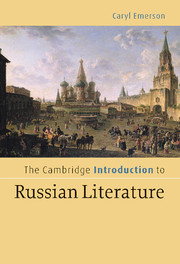Book contents
- Frontmatter
- Contents
- List of illustrations
- Acknowledgments
- Introduction
- 1 Critical models, committed readers, and three Russian Ideas
- 2 Heroes and their plots
- 3 Traditional narratives
- 4 Western eyes on Russian realities: the eighteenth century
- 5 The astonishing nineteenth century: Romanticisms
- 6 Realisms: Dostoevsky, Tolstoy, Chekhov
- 7 Symbolist and Modernist world-building: three cities, three novels, and the Devil
- 8 The Stalin years: socialist realism, anti-fascist fairy tales, wilderness
- 9 Coming to terms and seeking new terms: from the first Thaw (1956) to the end of the millennium
- Notes
- Glossary
- Guide to further reading
- Index
1 - Critical models, committed readers, and three Russian Ideas
Published online by Cambridge University Press: 05 June 2012
- Frontmatter
- Contents
- List of illustrations
- Acknowledgments
- Introduction
- 1 Critical models, committed readers, and three Russian Ideas
- 2 Heroes and their plots
- 3 Traditional narratives
- 4 Western eyes on Russian realities: the eighteenth century
- 5 The astonishing nineteenth century: Romanticisms
- 6 Realisms: Dostoevsky, Tolstoy, Chekhov
- 7 Symbolist and Modernist world-building: three cities, three novels, and the Devil
- 8 The Stalin years: socialist realism, anti-fascist fairy tales, wilderness
- 9 Coming to terms and seeking new terms: from the first Thaw (1956) to the end of the millennium
- Notes
- Glossary
- Guide to further reading
- Index
Summary
“Apart from reading,” Dostoevsky's Underground Man complains, “there was no place to go.” The metaphor is striking. So central was proper reading to the cultured Russian's self-image and sense of reality that poetry, fictional literature, memoirs, diaries, even personal letters from and among great writers almost constituted a place. The authority of these fictive or quasi-fictive residences was compelling and truth-bearing. What is the best point of entry into these alternative worlds?
Several models were considered for this book. The first was the most conventional: selected writers and their works juxtaposed to one another in chronological sequence. A second model suggested itself around distinctive Russian genres: saint's life, fairy tale, war epic, “notes” or casual jottings [zapiski], prison memoir, dysfunctional utopia, industrial production novel. Yet another structure emerged when the focus shifted to recurrent Russian heroes (or anti-heroes): righteous persons, fools, rogues, wanderers, frontiersmen, Europeanized fops, nihilists, superfluous men, salvational women, the merciful or tyrannical tsar. Special note was made of those types that did not take root in Russian soil or appeared only late on her literary horizon: the beautiful sinner, the chivalric knight, the virtuous merchant, the benign or productive bureaucrat. Each of these three formats raised interesting questions. How are we to explain the enduring popularity of the unconsummated love story or the epic that ends in defeat or dissolution of the goal? What about “heroless epic narrative” – the attempt to paint humanity on a vast historical scale and dispense with personal agency?
- Type
- Chapter
- Information
- The Cambridge Introduction to Russian Literature , pp. 11 - 33Publisher: Cambridge University PressPrint publication year: 2008



